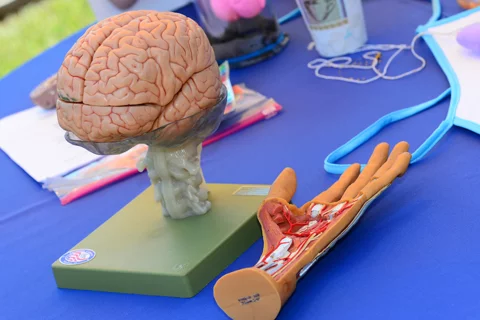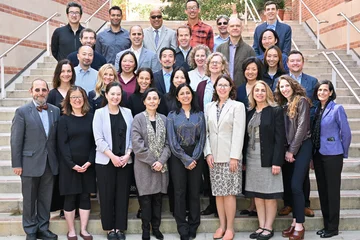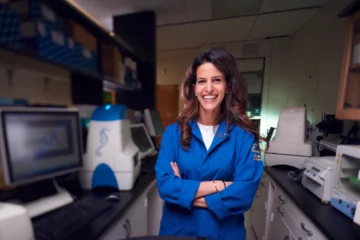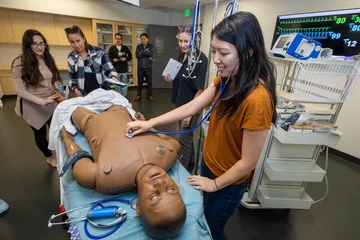A Day in the Life of Dr. Mark Morocco, UCLA Emergency Physician and Professor
Hospitals have long served as backdrops for popular TV series, from the 1970s favorite "M*A*S*H" to more recent hits like "Grey's Anatomy" and "House." While some medical TV shows take more creative liberties than others, many strive to portray hospital settings as accurately as possible. To do so, they hire real-life doctors to explain things firsthand.
Mark Morocco, MD, a UCLA emergency physician and professor in the David Geffen School of Medicine at UCLA, has lent his expertise to many medical TV shows. Here he discusses his behind-the-scenes role and why it's so important.
An Unlikely Career Path
After undergrad, Dr. Morocco worked as an actor, director and writer for nearly a decade. He even taught at New York City's High School of Performing Arts, coaching future stars like Jennifer Aniston.
Then, he was involved in a near-fatal car accident. "When I woke up in the intensive care unit after a trauma resuscitation and laparotomy, I realized emergency medicine was very interesting and socially meaningful work," he recalls. "The people who did it seemed engaged and passionate, the way artists were engaged and passionate. A few years later, I enrolled in medical school."
During his residency at UCLA, Dr. Morocco received a job offer from Neal Baer, MD, an old friend who was working on a new show called "ER."
"My residency director worked out a way for me to take the job and still finish my medical training," says Dr. Morocco. "We both felt it was good for the specialty. On one bad day of TV, even when ratings aren't that good, you can reach millions of people with public health issues and important medical advice."
Behind the Scenes
Dr. Morocco was one of several doctors on the set of "ER," each advising different parts of the show. "If we were shooting a scene where a patient needed surgery to repair a crushed leg, someone would help create the script, while another worked with the special effects guys to build the fake leg. Then someone coached the actor playing the surgeon about how it feels to have a patient who might lose a leg if you don't do your job right and how to say the words we say during operations."
Today, he is a full-time physician and professor, but he still consults on entertainment projects. Since "ER," he has worked on dozens of medical TV shows and movies, including NBC's "Third Watch," "County," (a television pilot produced by Emmy-winner Jason Katims) and most recently, a medical reality show called "Chasing the Cure."
"Now I mostly work on pilots. Writers have an idea for a show, but don't know what exactly physicians do or the best way to illuminate dramatic elements they want to bring out. I might help them find the right specialty for a character. That will inform what kind of patients the character sees, which will inform the cases he performs and the plotlines of the show."
Stranger Than Fiction
Dr. Morocco feels his work with the entertainment industry is an important way to communicate with the public.
"Mass media is a powerful lever," he explains. "Everybody is on Twitter now. Patients who come into the hospital probably spend more time reading about their conditions on Google than interacting with physicians. So communicating with the public through different channels is hugely important. You reach more people by working on a good TV show than by lecturing and publishing your whole life. But if you do it wrong, you can do real harm."
That's why he works with producers for whom medical accuracy is a priority. "With 'ER,' [show creator] John Wells knew that truth is always stranger than fiction, which we find out in medicine every day, and drama is almost always better when it's based on something real."




